While the main island of Hawaii or the Big Island may be known for its beaches and coffee plantations, there are also some historical, cultural and otherworldly sites to visit. They’re also part of the National Park system. Add these to your things to do on the Big Island and especially the national park sites in Hawaii.

Hawaii Volcanoes National Park
This park is the island’s most popular attraction and definitely worth the day trip. See two of the world’s most active volcanoes, Kilauea and Mauna Loa, in action and continually forming land. Crater Rim Drive and Chain of Craters Road are the two main routes through the park.
For visitors short on time, this road is a fantastic overview of what the park has to offer. Sulphur banks and steam vents line the road. There is a lookout into the Kilauea caldera and Halema’uma’u Crater where the lava lake glows at night and visitors could see the volcanic smoke.
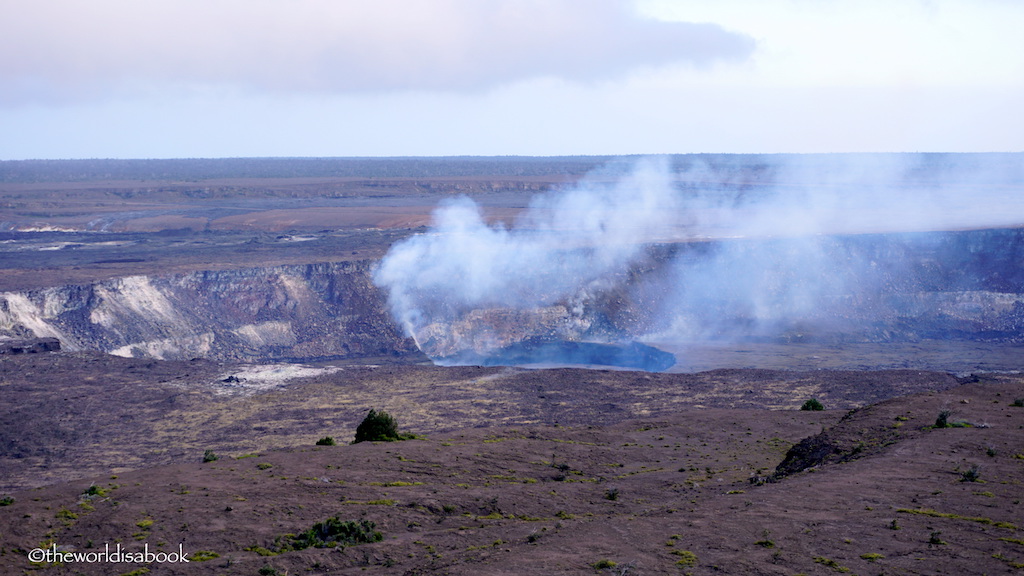
Thurston Lava Tube or Nahuku is one of the park’s most popular attractions. We loved walking through the lava tube that was formed over 600 years ago.
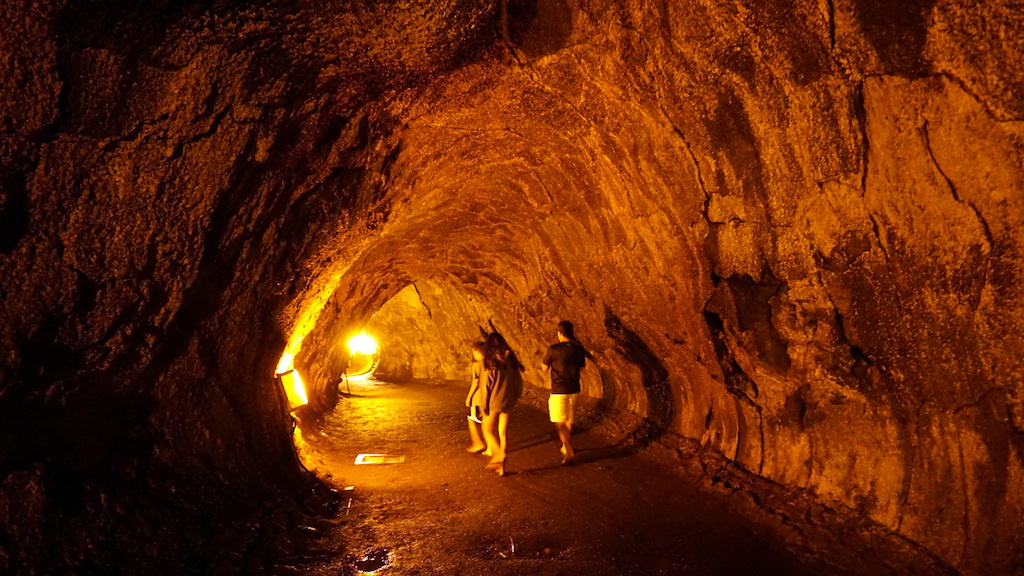
Our favorite route was the 38-mile (61 km) round-trip drive on the Chain of Craters Road. The landscape changed from a lush rainforest to dried lava fields and eventually ended at the coastline.
It was interesting to see where old lava flow ended into the ocean. It was amazing to see the rock formations here and especially the precarious Holei Sea Arch.
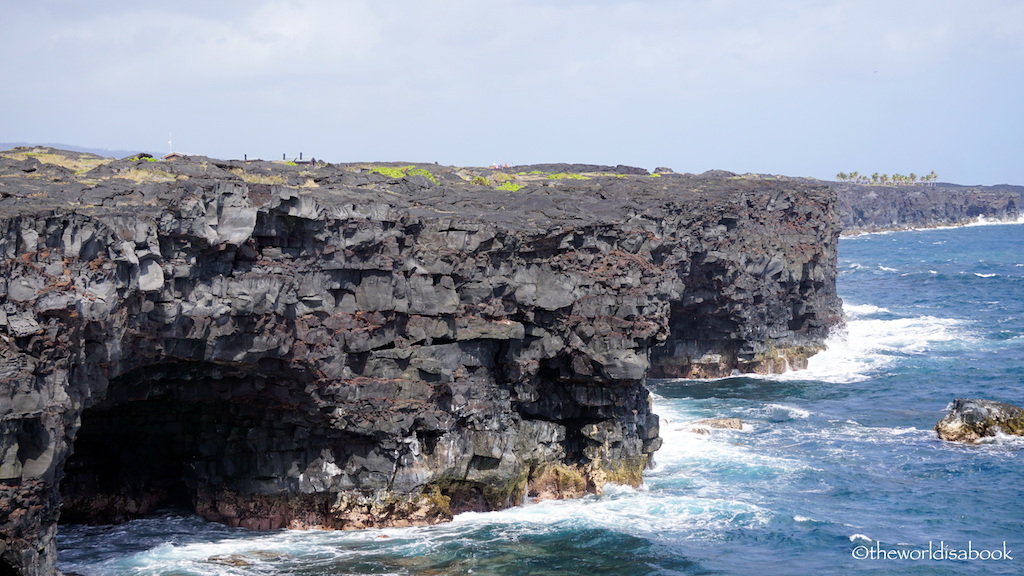
*Read all about our visits exploring Volcanoes National Park.
Puuhonua o Honaunau National Historical Park
This 180-acres historic park located south of Kona in Honaunau Bay is one of our favorite places in the Big Island. We revisit this place every time we are on the island.
Pu’uhonua means “place of refuge”. This area was used by ancient Hawaiians who broke the law to escape punishment which was usually death.
Defeated warriors or those who couldn’t fight during wars also sought refuge here. Though, the offenders had to get through the king’s warriors or swim through shark infested waters to get to this area. The site was also home of the royals in the Kona district.

The small Visitor’s Center is a wealth of information and there are usually ranger talks and walks to join. There’s also a short movie to watch.
There were several tables set up where visitors could learn about the park and Hawaiian culture. Park rangers were also readily available to answer any questions.
It was hard to miss the lava stone wall that separated the royal grounds and the sanctuary. The wall is 17 feet wide and about 10 feet high.
It’s amazing how they were able to build these without modern equipment. Ali’i or chiefs and their royal court once strolled through these royal grounds situated on the beautiful coast.

The reconstructed Hale o Keawe temple was the sacred site where 23 line chiefs were once buried.

Visitors are particularly attracted to several of the ki’i or carved wooden images that were around the temple. I’m not sure what most of them symbolized. But, these particular two by the shore seemed happy.

Walk around the temple area for more tranquil spots among the dried up lava flow, a grove of palm trees and some beautiful ocean views.

Explore the Cove
Keone’ele Cove was once how royalty entered these royal grounds using their canoes. It’s a beautiful and tranquil area today. Sometimes, honu or green sea turtles swim to shore and bask in the sun. We were lucky enough to see them here a few years ago but didn’t see any during this last trip.
This park was small enough that it was easy to do a self-guided walking tour and everything was well-maintained. Brochures at the visitor’s center had descriptions of the numbered sites.
The reconstructed village showed what life was like for the ancient Hawaiians. There were several artifacts on display in one of the huts including a canoe.
It was a bit like stepping back in time in an outdoor museum setting. It was quite interesting to imagine being an ancient Hawaiian living along these shores.

Ever wondered how some Hawaiians entertained themselves? My husband and son found this near the shore area. The ancient Hawaiians played a strategy game called konane that was almost like checkers. Black lava and white coral were used as the pieces and played on a carved rock which served as the gameboard.

Snorkel and Beach Time
If you’re into snorkeling, one of the best areas in the island is located nearby. “Two Step” was accessible via a one way public road just before the park entrance. Street parking is available but very limited.
Parking is available at a lot across the street for $5. There were a lot of people during our morning visit. My husband and daughter snorkeled here and really liked it. They saw a lot of colorful fish.
We highly recommend going to the adjacent beach area if you have some free time. Drive through the road to the left of the Visitor’s Center. It’s also accessible from inside the park on a gravel path.
This area was beautiful with plenty of palm trees, picnic benches and all the volcanic rocks. It’s a great place for seeing the tide pools.
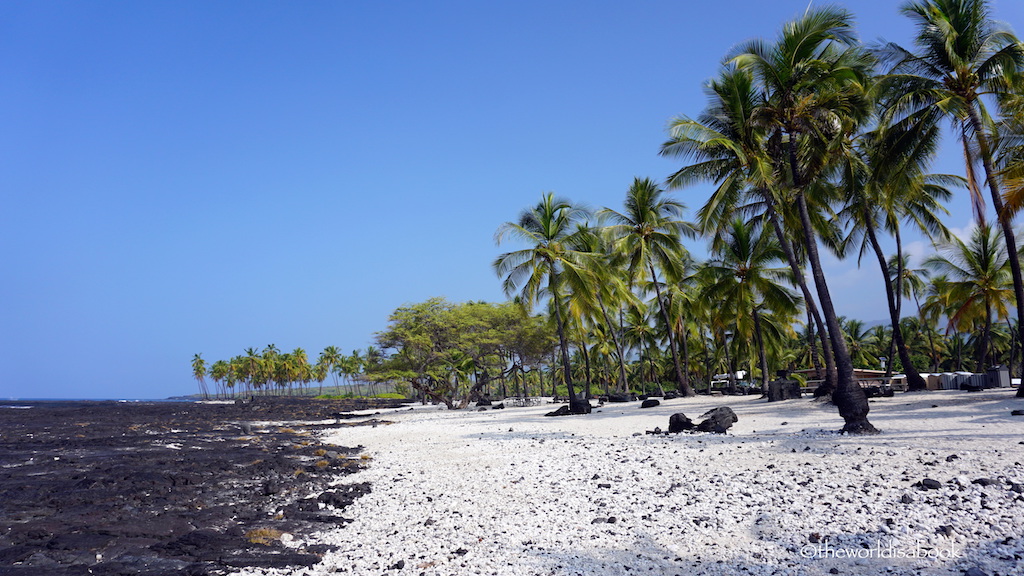
Tips for Visiting the Puuhonua o Honaunau National Historical Park
- Park Hours: 7AM until 15 minutes after sunset daily. The Visitor Center is open from 8:30 AM – 4:30 PM daily.
- Fees: $5.00 per vehicle good for 7 days
- Plan a safe and fun hike. Pick up a trail guide at the visitor center. Bring sturdy walking shoes, sunscreen and plenty of drinking water.
- Bring water, food since there are no food concession stands. You can fill up water bottles by a fountain near the restrooms.
- Apply plenty of sunscreen and insect repellant. It’s going to be quite hot and humid.
- Try to go early to beat the heat and crowds.
- If you’re coming from Kona, take Hwy 11 and down Hwy 160 (a right after the US post office). We decided to take Napoopoo Rd on the way back to Kona and there were some one way spots and it’s a harder road to navigate.
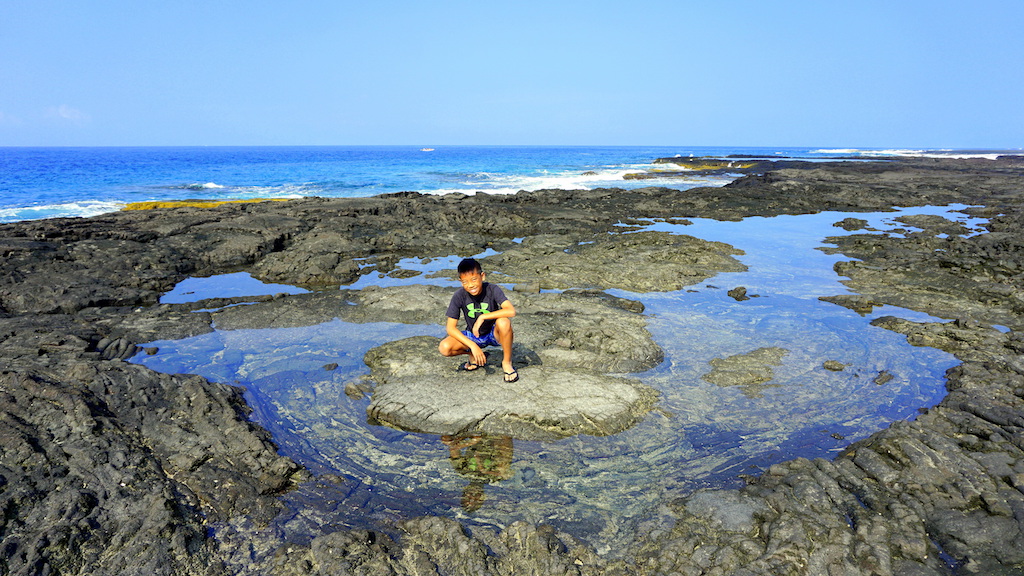
Kaloko-Honokohau National Historical Park
We actually didn’t know about this park until the Honaunau park rangers gave us a brochure when we asked where else we could see sea turtles. This coastal park was located just south of the Kona airport.
It protects an early Hawaiian seaside settlement and offers the chance for visitors to learn more about the local culture and the island’s natural history. It’s also a wonderful way to see how the ancient Hawaiians survived efficiently along this rugged coast.
We visited the Hale Ho’okipa Visitor’s Center which was located off the main Highway 19. The park is made up of several areas that contain petroglyphs and trails with remaining house platforms, stone walls, worship sites and native plants. The park also has two Hawaiian fishponds used by the natives to catch seafood that involved channels, traps and sluice gates.
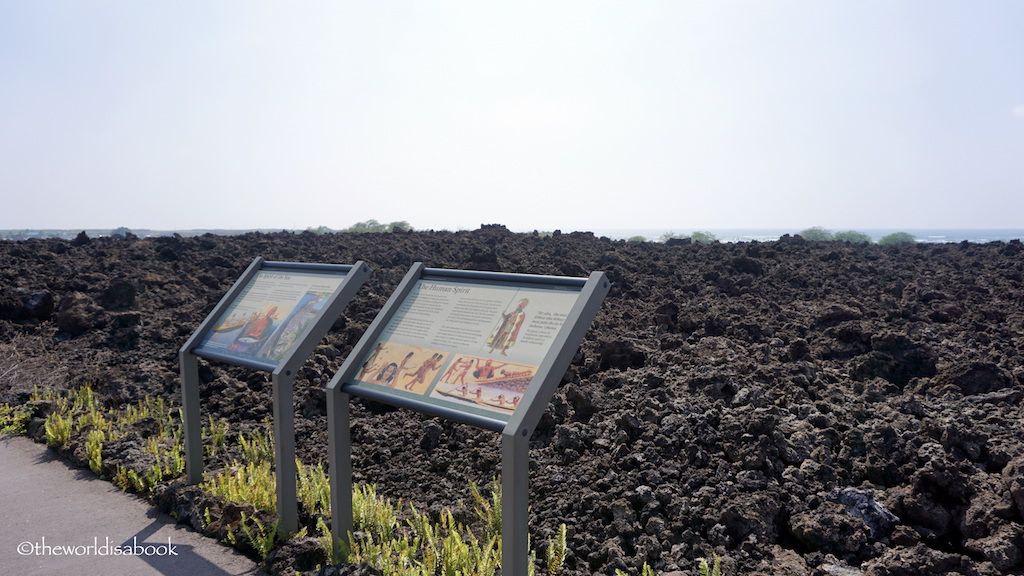
Visit the Two Beaches
Though, its two beaches of Honokohau and Ai’opio beach that stretched for about a mile are what we liked best about this park. We followed the entrance and a short trail from the Honokohau Boat Harbor.
We loved the calm water, white sand against the black lava rocks. It’s a great place to watch what emerges from the tide pools. There weren’t as many people here too which made for a great beach day.
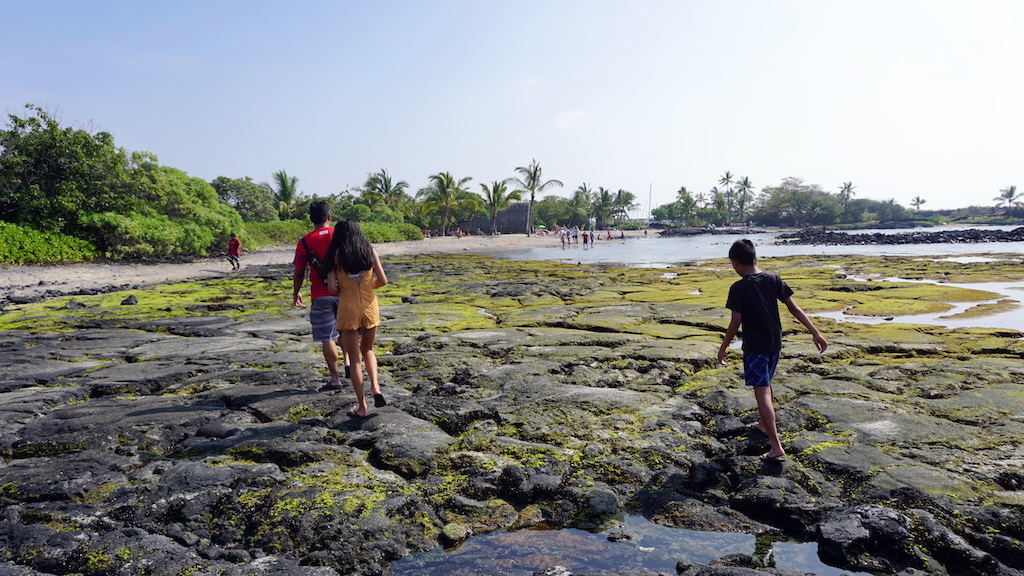
There was an ancient heiau or temple that was at the beach that showed a glimpse of how the ancient Hawaiians lived and survived. This particular area is made up of many miles of barren lava fields where nothing much grew in addition to a dry and hot environment.
It’s amazing to think how self-sufficient they were with raising crops, finding freshwater and using the ocean as a food resource. They also traded what they caught from the ocean with mountain residents who had fruit and vegetables.
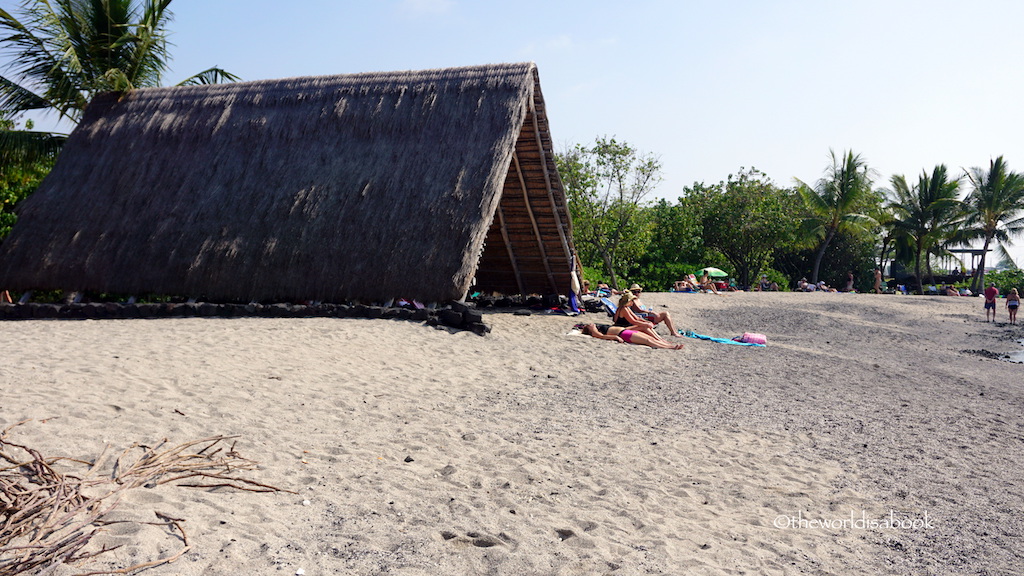
We got lucky and spotted many green sea turtles or honu in the water and along the shores here. The turtles enjoy coming here to feed on algae, seaweed and to bask in the sun. Some were using these plants for some shade.
The green sea turtle are a threatened species and fiercely protected by the state and federal laws. Visitors shouldn’t disturb or touch them and must always remain at least 15 feet away. Though, we did see some people come quite close for photos.
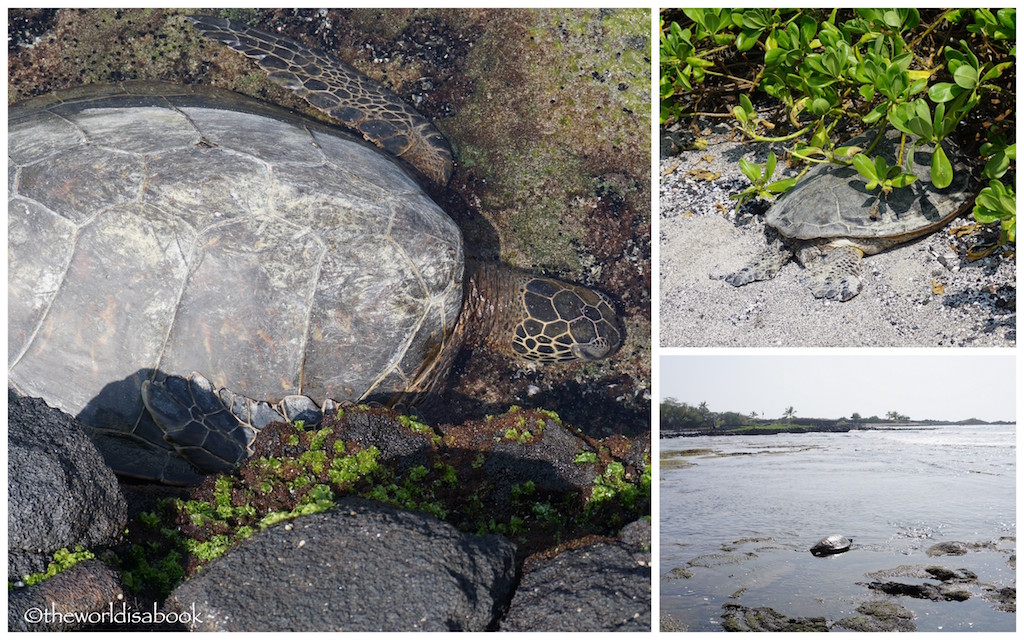
Tips for Visiting Kaloko-Honokōhau National Historical Park
- Free Entrance
- Hours: 8:30 AM to 4 PM (Hale Ho’okipa Visitor Center) daily. Park brochures with a map are available as well as a park audio tour.
- There are no lifeguards at the beach area. Some areas around the tide pools were quite slippery and be aware of high surf warnings.
- Wear closed toe and appropriate for walking/hiking shoes on gravel trails and in some areas on lava flows.
- Bring water if hiking the trails .
- Fishing and gathering of some ocean resources are allowed. Check with the park rangers.
Pu’ukohola Heiau National Historic Site
We recently visited this national park site and it was so worth the stop. Located in the Kohala coast area, the park consists of Mailekeni Heiau and the imposing Pu’ukohola Heiau.
It’s a small historic site with beautiful ocean views. Heiaus are Hawaiian temples or sacred sites.
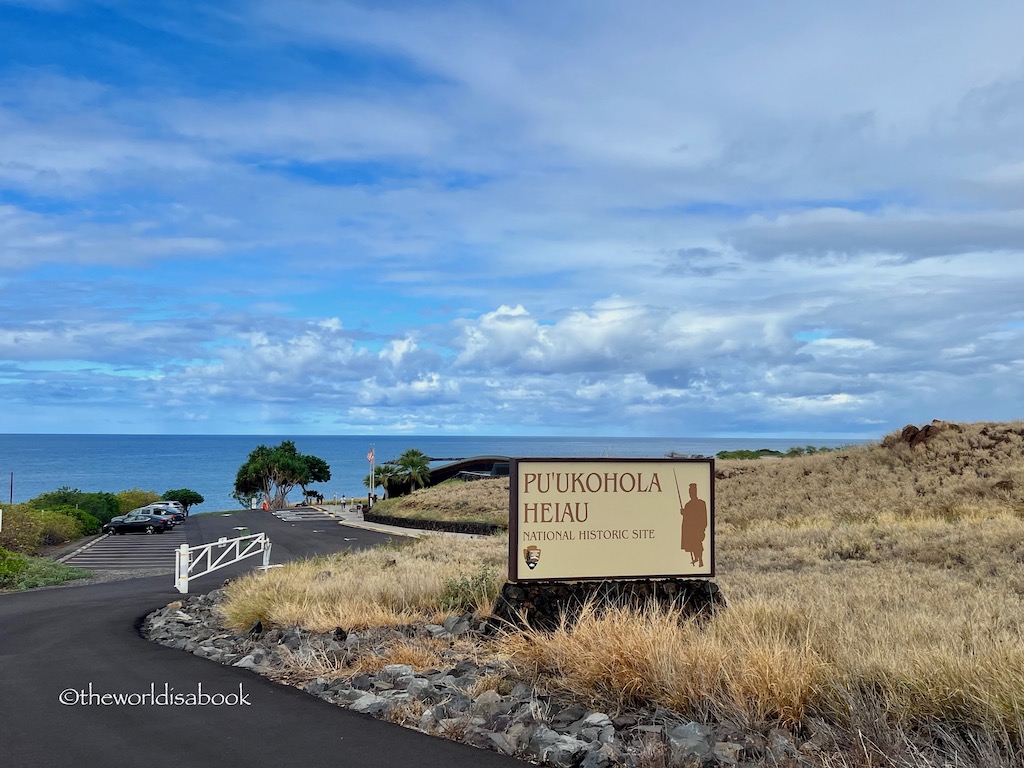
Go to the Visitors Center
If you can only do one thing in this visitor center, we highly recommend watching the 20 minute movie about the history of the park and Hawaii. The movie is well done and contains so much interesting history and information.
We’ve visited Hawaii for many years and this was the first time we got clarity and understanding of how King Kamehameha I came to power and ultimately united the Hawaiian islands.
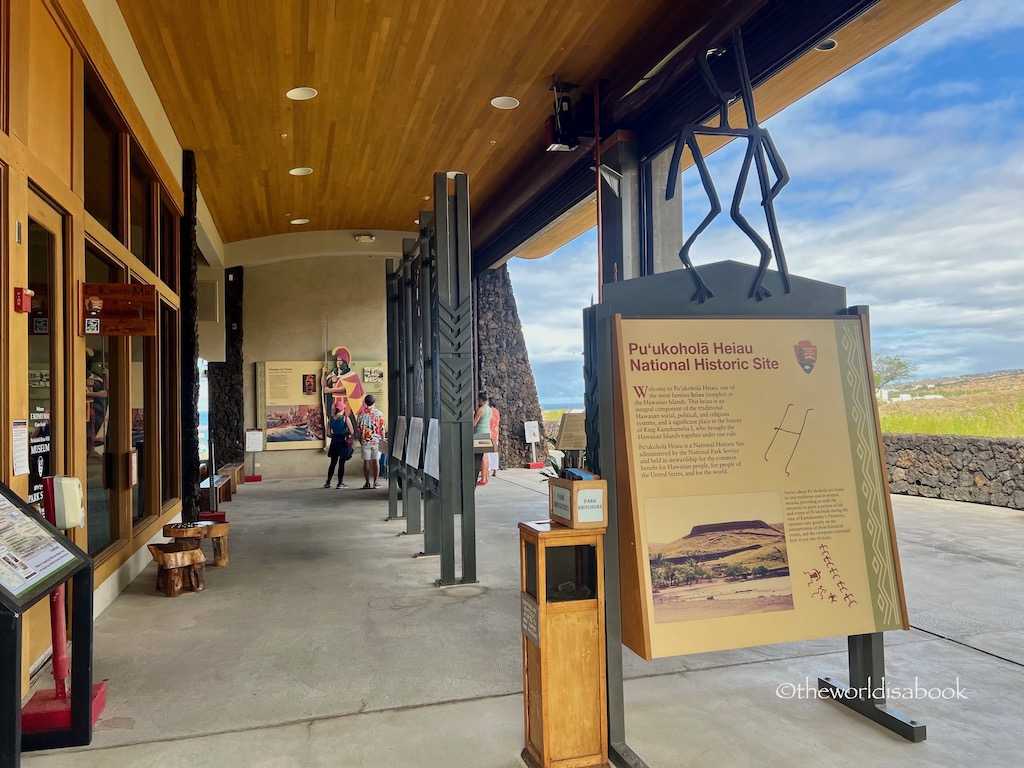
Visitors can do a self-guided walking tour after the visitors center. We spent about an hour walking the park’s 1/2 mile loop trail and part of the Ala Khaki National Historic Coastal Trail.
We got lucky there was a park ranger here doing a demonstration and making an ʻahu ʻula or a feathered cloak. It was such an interesting process to watch and learn about. We loved watching him do such an intricate work of art, learn how Hawaiian royalty wore them and how they acquired the feathers.
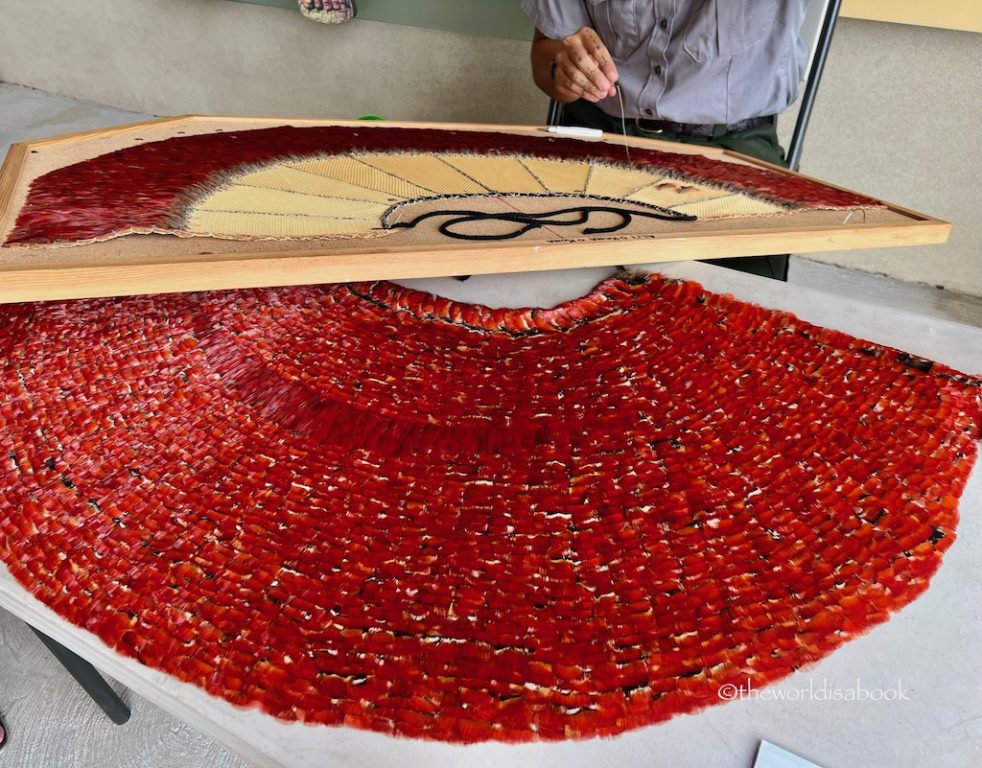
Exploring the Heiaus
Pu’ukohola Heiau (which the national park site is named after was considered the temple on the Whale Hill and today is the site of cultural events. King Kamehameha I built this is in 1790-91.
Mailekeni Heiau is on the hillside near the sea. These ruins were thought to be an ancient war or agricultural temple used by King Kamehameha I’d ancestors. This temple eventually became a fort.
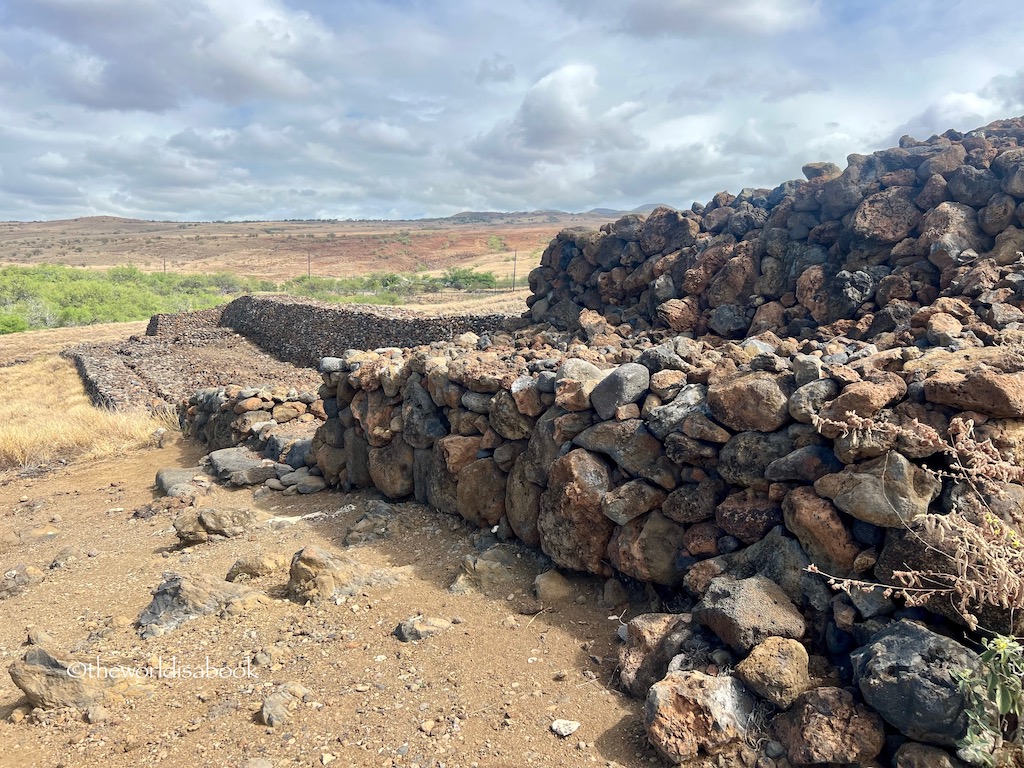
Don’t miss the stone leaning post overlook. This marker overlooks what was once the Hale o Kapuni Heiau which was a temple dedicated to the shark gods. Unfortunately, this heiau is now underwater and was last seen in the 1950s.
There is also the Pelekane area which is the site of the royal courtyard and located by the ocean. The Samuel M. Spencer Park public beach was adjacent to this national park site which is easy to combine some history and cultural lessons with a beach day.
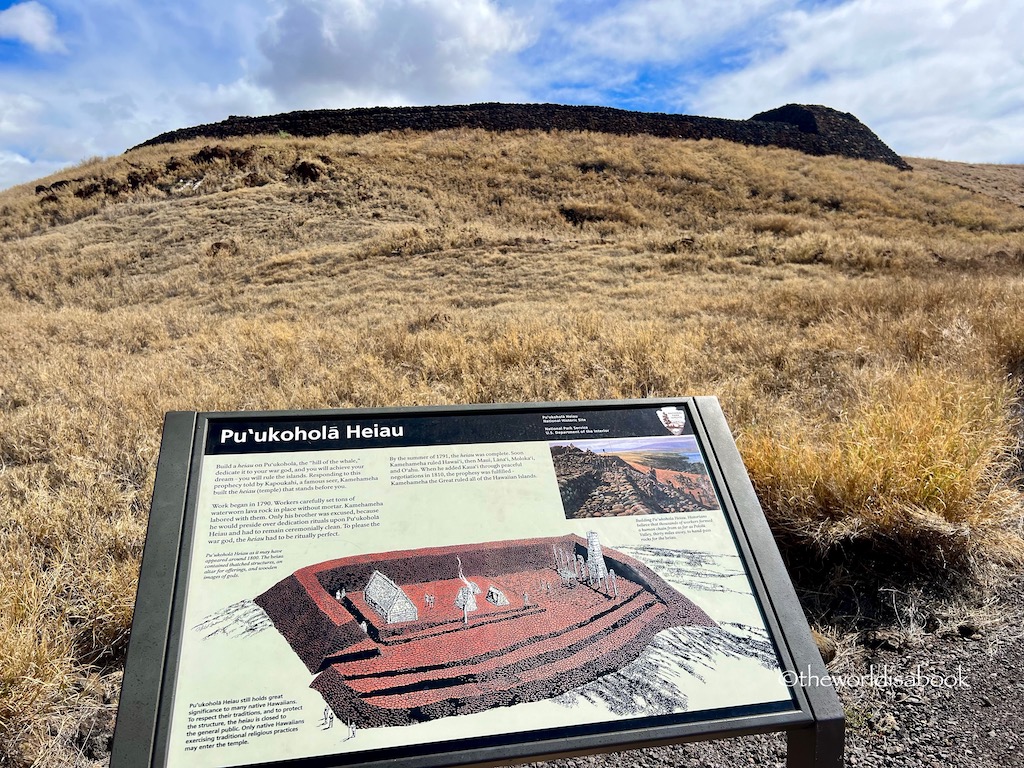
Tips for Visiting Pu’ukohola Heiau National Historic Site
- Free entrance to the park
- The park is open daily from 7:30AM–5:00PM and year-round, including all Federal and State Holidays.
- Bring water during your walk. There is no shade for most of the trail.
- Check out the park’s audio tour when you visit to help enhance your visit.
General Tips for Visiting National Park Sites in Hawaii
- Save money by buying the America the Beautiful Pass for $80 good for all the US parks. There is also a Lifetime Pass for $10 for US citizens and permanent residents over 62 years old (price will be increasing to $80 soon). The US National Park sets aside several days annually to enter the parks for free. Check the National Park Service site every year.
- If you have a 4th Grader, they can get an Every Kid Outdoors pass that’s valid for 12 months. Passes must be printed. Visit the Every Kid Outdoors website.
- Be sure to get the Junior Rangers packet for kids at the parks to earn their Junior Ranger badges.
Have you visited any of these national park sites in Hawaii?
Pin it for later!
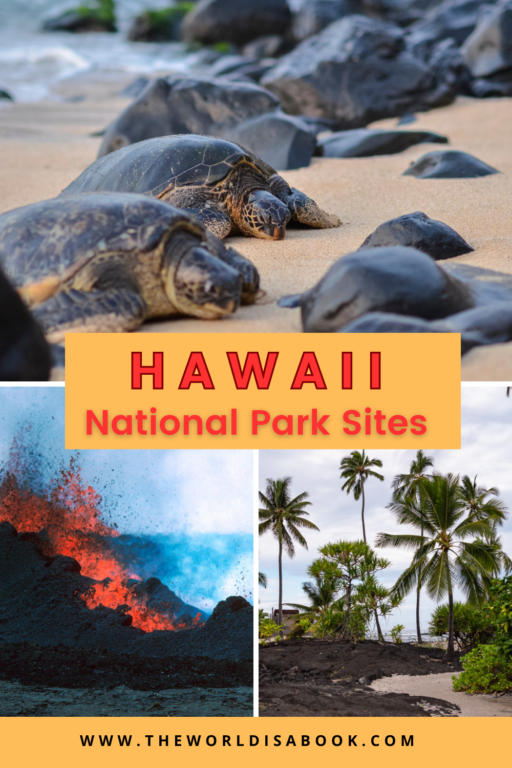
Fantastic! I’ve been to Kauai as a teen but would love to go back and explore more of the other islands! It all looks so much more exotic than what I saw! #wkendtravelinspiration
I think you’d really like the Big Island. It’s a completely different landscape than Kauai with the volcanic rocks and lava in many places.
The volcanoes in Hawaii are awesome. I’d love to walk through the lava tube at the national park.
The lava tube wasn’t very big but it is quite an experience. Hope you visit Hawaii soon.
There’s just something fascinating about a lava tube! I can’t believe I’ve never hear dof national Parks Week with free admission? What? Thanks for another inspiring link up! #wkendtravelinspiration
So true about lava tubes. There are actually several days a year that are free admission to the national parks. Love National Park week though!
I’ve not made it to the Big Island yet but I love all the history and natural beauty that you found there. I especially like the photo of your husband and son playing the Hawaiian checkers game – it’s a perfect picture, to me, of family travel. Beautiful photos!
Thank you Jill! They were so excited to find that checker table. I hope you can visit the Big Island soon.
We love visiting the National Parks, so I bought the America the Beautiful Pass last fall. It’s definitely worth the money. Hopefully one day I’ll make it back to Hawaii so I can check out some of the National Parks there!
We love visiting the parks and the pass is such a great value.
We love national parks and I’d love to visit the ones in Hawaii. #weekendwanderlust
Celebrated my 10 year anniversary in HI, but didn’t make it to Big Island. My kids want to go to HI next year. I’ll have to put this on my list.
David and I love Hawaii but we have never been to the Big Island. I think we need to put it on our list.
I have not made it to the big island yet. I would really like to see the volcanoes though, its just so unique and impressive. Hopefully someday! Thanks for sharing on #TheWeeklyPostcard.
I want to visit the Volcano park it looks amazing #WeekendWanderlust
I can’t believe I’ve never been to Hawaii. It’s been hot on my radar, and I love national parks, so I need to find a way there! I’ve always wanted to see the volcanoes…and the Chain of Craters Road sounds amazing. #theweeklypostcard
Wow! These are certainly on my radar now. Are there national parks on Hawai’i too? I am considering a trip there this fall. Do you have a post on that? Stopping by from #WeekendWanderlust -and- #TheWeeklyPostcard ;)
Whoops, I meant on Oahu. Can’t keep my islands straight!
Yes, Oahu has World War II Valor in the Pacific National Monument, home of the USS Arizona Memorial. Unfortunately, I don’t have a post on that.
The lava tube certainly looks something my teenage boys would love… great photos! #TheWeelyPostcard
Your beautiful post reminded me why I love Hawaii so much. We visited this island so many times and yet we can never get bored of these gorgeous sites. I loved the lava tubes!
Simply amazing! It is incredible how much diversity, in terms of landscapes, you can find on the Big Island. The Volcanoes Park is breathtaking (that is for sure) but the coastal park are great too. Thanks for sharing your photos and experiences. We need to place attention to these destination more than ever (I am sure you are aware of the current situation). #TPThursday
we went to Hawaii last summer and did the Volcano National Park, but missed these other two! My kids loved getting Junior Ranger badges, and great to know about the fourth grade year.
Found you from #weekendwanderlust
Black lava and white sand reminds me of black lava and snow on Mt. Etna in Sicily! It’s pretty weird at least the lava and sand can’t mix to a slushy grey like it does on Etna. Walking in the lava tube looks amazing. Your photos really set the scene. I particularly like the wooden statues and the green palm trees, white sand and black lava photos – Oh and the one of your son in the rock pool. I could go on lol.
Your post brougt some wonderful memories from my trip to the Big Island of Hawaii! What an island! We only managed to visit Hawaii Volcanoes National Park, would love to go back and explore the Historical Parks one day! Pinned for the future! Thanks for sharing #TheWeeklyPostcard
I’ve yet to make it to the Big Island! I love the National Parks system, such treasures for us and for future generations to explore and enjoy. :-)
The diversity of our National parks is really amazing, from the Everglades at one side of the country to this incredibly interesting park at the end side. This is a good reminder I would love to spend some time exploring here.
These are nice photos!
I’ve never heard of that last park. I wonder if it was had been established when we visited Hawaii seven years ago. One of my favorite memories from that trip was doing the Junior Ranger program at Puuhonua o Honaunau National Historical Park. When we asked my then 5 year old daughter how the lava stone wall was built without modern machinery, we were so surprised when she said they used an incline plane. Thank you “Sid the Science Kid”!
We haven’t hit the Big Island yet – maybe this summer? Definitely visiting all these parks when we get there! Mahalo for sharing on #TheWeeklyPostcard :)
I was really interested to read a little of this other side to Hawaii. Usually it’s all about sandy beaches, but the history and culture sound fascinating too. I love exploring national parks!